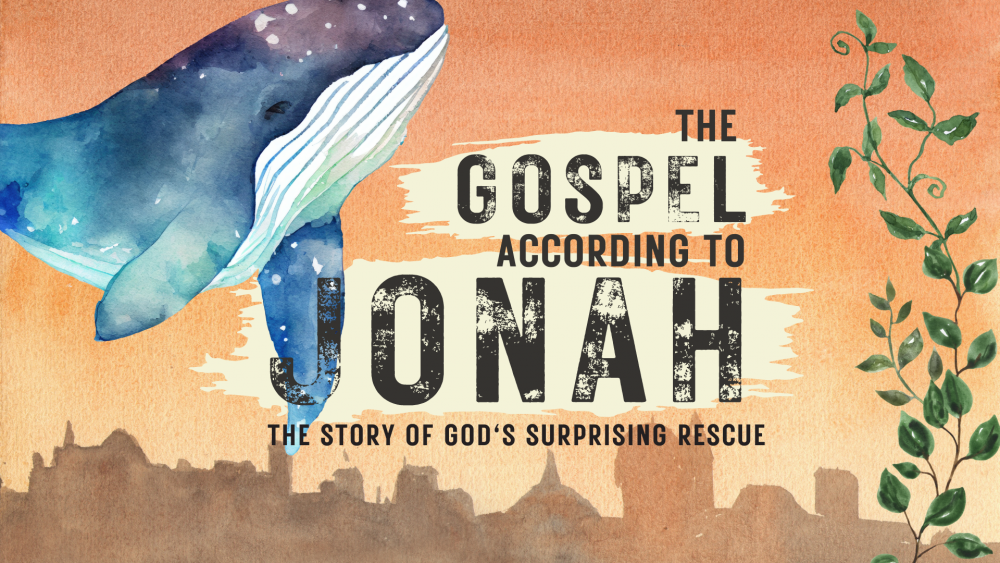Questions for Personal Reflection and Group Discussion
Bobby Warrenburg - September 24, 2023
The Trouble with God

Scripture References: Jonah 4:1-10, Jonah 3:11
From Series: "The Gospel According to Jonah: God's Surprising Rescue"
Powered by Series Engine
Read Jonah 3:10-4:11:
3:10 When God saw what they did, how they turned from their evil way, God relented of the disaster that he had said he would do to them, and he did not do it.
4:1 But it displeased Jonah exceedingly, and he was angry. 2 And he prayed to the Lord and said, “O Lord, is not this what I said when I was yet in my country? That is why I made haste to flee to Tarshish; for I knew that you are a gracious God and merciful, slow to anger and abounding in steadfast love, and relenting from disaster. 3 Therefore now, O Lord, please take my life from me, for it is better for me to die than to live.” 4 And the Lord said, “Do you do well to be angry?” 5 Jonah went out of the city and sat to the east of the city and made a booth for himself there. He sat under it in the shade, till he should see what would become of the city. 6 Now the Lord God appointed a plant and made it come up over Jonah, that it might be a shade over his head, to save him from his discomfort. So Jonah was exceedingly glad because of the plant. 7 But when dawn came up the next day, God appointed a worm that attacked the plant, so that it withered. 8 When the sun rose, God appointed a scorching east wind, and the sun beat down on the head of Jonah so that he was faint. And he asked that he might die and said, “It is better for me to die than to live.” 9 But God said to Jonah, “Do you do well to be angry for the plant?” And he said, “Yes, I do well to be angry, angry enough to die.” 10 And the Lord said, “You pity the plant, for which you did not labor, nor did you make it grow, which came into being in a night and perished in a night. 11 And should not I pity Nineveh, that great city, in which there are more than 120,000 persons who do not know their right hand from their left, and also much cattle?”
- Why was Jonah angry?
- Discuss what was ironic about Jonah not wanting God to be “a gracious God and merciful, slow to anger and abounding in steadfast love, and relenting from disaster.”
- It seems strange that Jonah didn’t realize the irony of his words, yet at times we can be like this too. If you’ve ever caught yourself in this mindset, share about that.
- Why does resentment block a person’s access to God’s mercy and healing?
- If you’ve ever experienced how grumbling or resentment can begin to take over your heart and life, share about that with your group. What helps keep pain, tragedy or resentment from taking over your heart and life?
- Psalm 121:5b-6 describes how God “will be the shade at your right hand, so that the sun will not strike you by day nor the moon by night.…” Share about ways you’ve experienced God as your shade in life.
- In C.S Lewis’s book, The Lion, the Witch, and the Wardrobe, Aslan the lion, who represents Jesus Christ, describes the “magic” that goes deeper than the “you get what you deserve” law of the land. Aslan offered to die in place of Edmund, who had selfishly betrayed his own siblings and sold himself to the evil White Witch. But when Aslan came back to life, he explained: “When a willing victim, who has committed no treachery, is killed in a traitor’s stead, the stone table will crack, and even death itself would turn backwards.” Discuss what Lewis was trying to communicate.
- Author and theologian Thomas Carlisle wrote a series of poems on the book of Jonah. Read his final poem, called “Coming Around” and discuss it with your group. “And Jonah stalked to his shaded seat and waited for God to come around to his way of thinking. And God is still waiting for a host of Jonahs in their comfortable houses to come around to His way of loving.”
- What did you sense God saying to you through this message?
